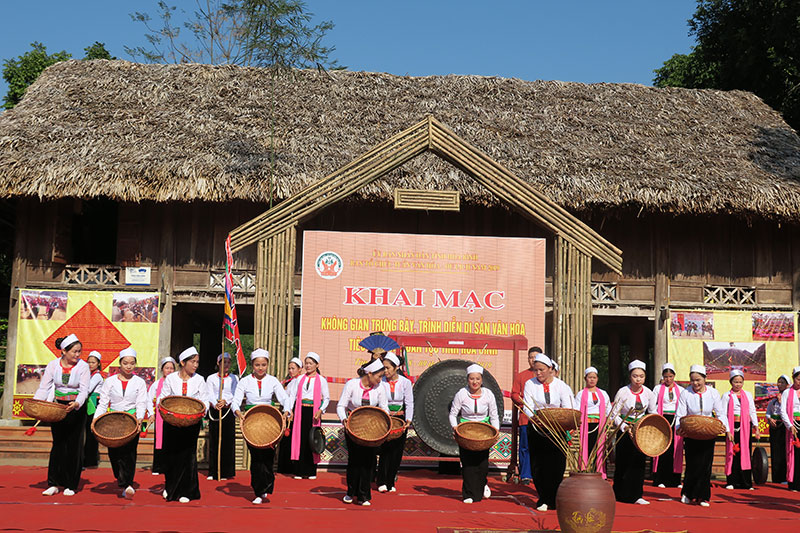
(HBO) - On December 8, at the opening of Luy Ai village, Phong Phu commune (Tan Lac district), the opening of the exhibition space and demonstration of typical cultural heritage of ethnic groups in Hoa Binh province.
Participating this event, there are over 100 artisans representing 5 ethnic minorities in Hoa Binh province, including: Muong, Thai, Tay, Dao, Mong. In addition to the welcome performance of the artists of Luy Ai village, each group performed a typical repertoire of their people to introduce to the people and tourists.
At Luy Ai hamet also displays hundreds of photos of the daily life, activities, cultural characteristics of ethnic minorities of the province. Coming to Luy Ai hamlet on this occasion, delegates and tourists also visit and experience traditional craft models such as weaving, making Lam rice, making Can wine which are being maintained as tourism products.
This is aimed to educate the younger generation about the nation's historical and cultural traditions. At the same time, introduce and promote the image of the land and people of Hoa Binh province to domestic and international visitors.
Hoa Binh province is undergoing a dynamic transformation amid Vietnam’s national digital transition. Building on Poliburo’s Resolution No. 57-NQ/TW on breakthroughs in science, technology, innovation, and national digital transformation, the province has rolled out a wide range of practical action plans. A standout initiative is the "Digital Literacy for All” movement, an effort to ensure that no one is left behind in the digital era.
Hoa Binh province is undergoing a dynamic transformation in the wake of the national digital transformation movement. Building on Resolution No. 57-NQ/TW of the Politburo on breakthroughs in science, technology, innovation, and national digital transformation, the province has implemented a wide range of practical action plans. A standout initiative is the "Digital Literacy for All” movement ambitious effort to ensure that no one is left behind in the digital age.
With a spirit of unity and proactive problem-solving, the Party Committee, the government and the people of Dong Lai Commune (Tan Lac District) have made great strides in implementing the resolutions of the 24th Party Congress of the commune for the 2020 - 2025 term. Focusing on leadership and practical actions, the commune has brought the Party’s resolutions into daily life, creating strong impacts and pushing the local development forward.
Amid the nationwide push for digital transformation, young people in Hoa Binh Province are stepping up as dynamic pioneers, applying technology to enhance Youth Union operations and expand the reach of youth-led initiatives. Through creativity and adaptability, Youth Union organizations at all levels have introduced a series of practical solutions, contributing to modern governance and community development.
In recent years, An Nghia commune, located in Lac Son district, has stepped up administrative reform, focusing on improving the quality and efficiency of its single-window service unit for receiving and processing administrative procedures. These improvements have helped create favourable conditions for local residents and organisations to handle administrative procedures, contributing to the commune’s broader socio-economic development.
The Prime Minister-approved master plan to develop the multi-use value of forests ecosystems through 2030, with a vision to 2050, aims to improve the management and sustainable use of forest resources, create jobs, increase incomes, and improve the living standards of ethnic minorities, people in mountainous and remote areas, forest workers and those living near forests.



